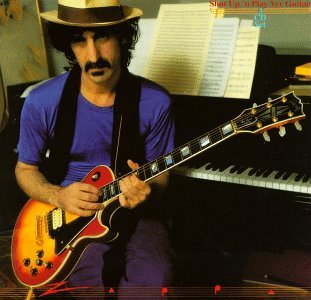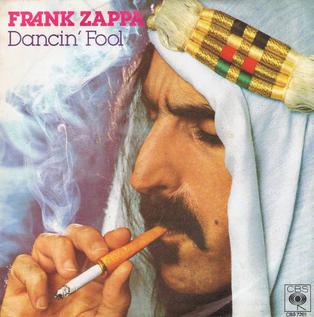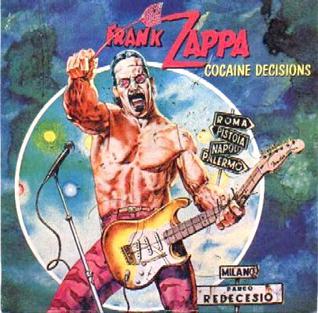
Frank Vincent Zappa was an American singer-songwriter, multi-instrumentalist, composer, film-maker, and bandleader. His work is characterized by nonconformity, free-form improvisation, sound experiments, musical virtuosity, and satire of American culture. In a career spanning more than 30 years, Zappa composed rock, pop, jazz, jazz fusion, orchestral and musique concrète works, and produced almost all of the 60-plus albums that he released with his band the Mothers of Invention and as a solo artist. Zappa also directed feature-length films and music videos, and designed album covers. He is considered one of the most innovative and stylistically diverse rock musicians of his era.

200 Motels is a 1971 surreal musical film written and directed by Frank Zappa and Tony Palmer, and featuring music by Zappa. An international co-production of United States and the United Kingdom, the film stars the Mothers of Invention, Theodore Bikel and Ringo Starr.

The Mothers of Invention were an American rock band from California. Formed in 1964, their work is marked by the use of sonic experimentation, innovative album art, and elaborate live shows.

Shut Up 'n Play Yer Guitar, a project consisting of Shut Up 'n Play Yer Guitar, Shut Up 'n Play Yer Guitar Some More and Return of the Son of Shut Up 'n Play Yer Guitar, is a series of albums by Frank Zappa. Released as separate albums in May 1981 on Barking Pumpkin Records, it was subsequently reissued as a triple album box set in 1982.

Thing-Fish is an album by Frank Zappa, originally released as a triple album box set on Barking Pumpkin Records in 1984. It was billed as a cast recording for a proposed musical of the same name, which was ultimately not produced by Zappa, but later performed partially in 2003, ten years after his death.

Mothermania (1969), subtitled The Best of the Mothers, is a compilation album by the Mothers of Invention. While the songs were previously released on Freak Out!, Absolutely Free and We're Only in It for the Money, it contains unique mixes or edits made specifically for this compilation.

Shiny Beast is the tenth studio album by American rock band Captain Beefheart and the Magic Band, released in October 1978 by Warner Bros. Records. The album emerged from production difficulties surrounding Bat Chain Puller, an album Captain Beefheart recorded for DiscReet and Virgin Records in 1976. DiscReet co-founders Herb Cohen and Frank Zappa feuded over the production of the album, because Cohen funded the production with Zappa's royalty checks. Captain Beefheart recorded a new album titled Shiny Beast due to Zappa withholding the master tapes of the original Bat Chain Puller album.

You Can't Do That on Stage Anymore, Vol. 3 is a double disc live album by Frank Zappa, spanning from December 10, 1971 to December 23, 1984. It was released in 1989.

You Can't Do That on Stage Anymore, Vol. 6 is the last of six double disc collection volumes of live performances by Frank Zappa recorded between 1970 and 1988. All of the material on Disc one has a sexual theme. Zappa used the monologue in "Is That Guy Kidding or What?", to ridicule Peter Frampton's album I'm in You with its double entendre title and pop pretensions. Disc two includes performances from Zappa's shows between 1976 and 1981 at the Palladium in New York City, as well as material like "The Illinois Enema Bandit" and "Strictly Genteel" that he frequently used as closing songs at concerts. It was released on October 23, 1992 under the label Rykodisc.

"Valley Girl" is a song by American musician Frank Zappa and his then-14-year-old daughter, Moon Zappa. The song appeared on Zappa's 1982 album Ship Arriving Too Late to Save a Drowning Witch and was released as a single, becoming his sole Top 40 hit.
"Muffin Man" is a song recorded live by Frank Zappa and The Mothers of Invention. It appears on his 1975 mostly live album Bongo Fury made with Captain Beefheart. The song begins with studio-recorded spoken word lyrics delivered by Zappa and is followed by the chorus. The song was inspired by the traditional nursery rhyme, The Muffin Man. The song closes the album, as well as the compilation Strictly Commercial, and was also used as a finale in concerts for many years afterwards. The song's tone was compared to Jimi Hendrix's style. An alternative live version of "Muffin Man" appears on disc one of the compilation You Can't Do That on Stage Anymore, Vol. 6. This song also appears on the 2009 album released by the Zappa Family Trust Philly '76, the 2002 album FZ:OZ and the 2003 album Halloween.
"Wind Up Workin' in a Gas Station" is the opening song on Frank Zappa's 1976 album Zoot Allures. The song contains a fake German accent from Zappa as a result of Zappa's fascination with the German culture. In concert, the extensive repetition of the lines "Show me your thumb if you're really dumb" was given the response by the audience members putting both thumbs firmly in the air. Despite the lyrics being pessimistic, the song became a fan favorite. A live version can be found on You Can't Do That on Stage Anymore, Vol. 6.

"Who Are the Brain Police?" is a Frank Zappa song, performed by The Mothers of Invention, released on the Mothers' debut album, Freak Out!. It was released by Verve Records as a single in 1966. Zappa stated that the song was one of religious theme.

"Dancin' Fool" is a song by Frank Zappa from his 1979 album Sheik Yerbouti. It was the first of two singles released from the album, followed by the second single "Bobby Brown ." The song premiered on stage on the 30th of October 1977. Much like Zoot Allures' closing track "Disco Boy", it mocks the disco culture of the 1970s, but unlike "Disco Boy", the song directly focuses on the dancing aspect of the culture. Specifically, the character Zappa is singing as cannot help but dance, despite how awful he is at it. He refers to his dancing as "social suicide" and says, "The beat goes on and I'm so wrong." He mentions as part of the reason for his bad dancing that, "One of my legs is shorter than the other," a reference to a severe injury Zappa sustained at the Rainbow Theatre in 1971. "Dancin' Fool" charted at 45 on the U.S. charts, making it Zappa's 2nd highest charting single, behind his 1982 song, "Valley Girl". The song was nominated for the Grammy award for "Best Male Vocal", but did not win. It was included on Zappa's best of compilation, Strictly Commercial.
"Memories of El Monte" is a metasong released in 1963 by the Penguins featuring Cleve Duncan. It was written by Frank Zappa and Ray Collins before they were in the Mothers of Invention. The song was first released as Original Sound 27.

"Joe's Garage" is a single on Frank Zappa's 1979 album Joe's Garage Act I. After the introductory track, "The Central Scrutinizer", this song begins the story of Joe's Garage. Although it only charted in Norway and Sweden, it was one of Zappa's songs which had the most airplay on American FM radio, at the time still album-centered. The song was played in concert from 1980 to 1988 along with the song "Why Does it Hurt When I Pee?" in all tours of Zappa's after the single's release. The single version of the song lacks many of the special effects that the album version contains. The single version of "Joe's Garage" was put onto Zappa's best-of Strictly Commercial.

"I Don't Wanna Get Drafted" was a 1980 single by American musician Frank Zappa. It was rerecorded for the 1981 album You Are What You Is under the title "Drafted Again". The record company Zappa was with at the time, Mercury, refused to release it as a single. Zappa instead created his own record company, Barking Pumpkin, and released it from there. It peaked at #103 US Billboard and #68 on Cash Box, but more successfully reached 3 on Swedish Charts. The single version was later included on Zappa's posthumously released The Lost Episodes.

"Find Her Finer" is a 1976 single by Frank Zappa from the album Zoot Allures. The song was recorded with Zappa's lips extremely close to the microphone, creating an intimate sound. Roy Estrada provided falsetto vocals to create a comic effect to the song. It was intended to be the lead single for Zoot Allures, but failed to chart, unlike its other single "Disco Boy". A live and sped up jazz version can also be found on the album The Best Band You Never Heard in Your Life. It was played in concert in 1976 and 1988.

"Cocaine Decisions" is a 1983 single by American musician Frank Zappa, from the album The Man from Utopia. A live version was on the album You Can't Do That on Stage Anymore, Vol. 3. It was played in concert from 1981 to 1984.
"Uncle Remus" is a song written by American musicians Frank Zappa and George Duke, and first released on Zappa's 1974 album Apostrophe ('). The name of the song is derived from Uncle Remus, a fictional character found in works by writer Joel Chandler Harris. The song has been said to reflect Zappa's feelings about racism and the civil rights movement, themes which had previously been explored in his earlier song "Trouble Every Day".
















